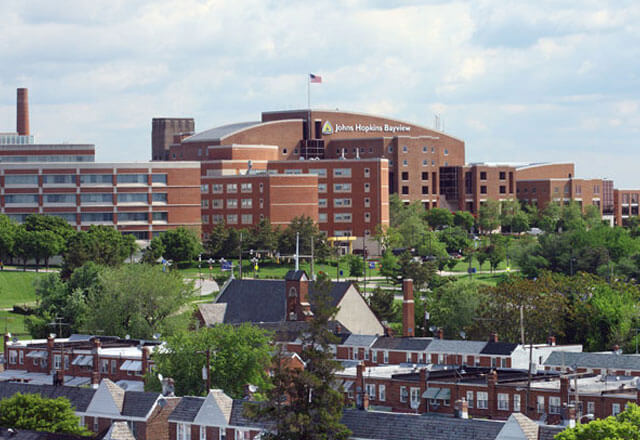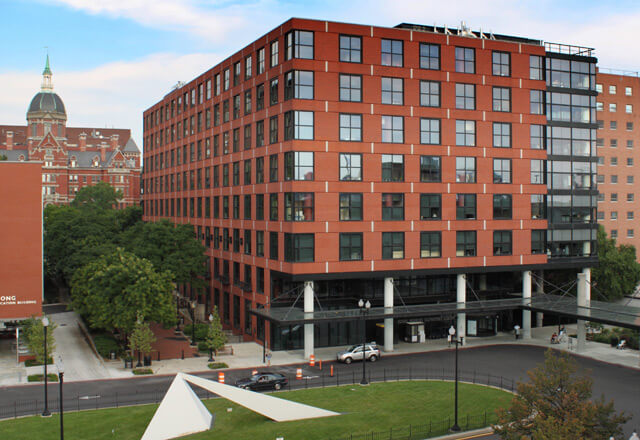Meet Our Specialists
Meet our team of audiologists and otolaryngologists.
New masking guidelines are in effect starting April 24.
Vaccines & Boosters | Testing | Visitor Guidelines | Coronavirus
In the past 20 years, hearing care has undergone a revolution, with new hearing aids that are smaller and more effective than ever before. There's never been a better time to emerge from the isolation of hearing loss.
Meet our team of audiologists and otolaryngologists.
Specialized pediatric services are available including the Infant Hearing Early Access and Rapid Diagnostic Detection (iHeardd) Clinic.
Learn more about hearing testing and treatment.
Six locations are available to serve you in the Baltimore and Washington, D.C. metro areas.
Our skilled multidisciplinary team can help you with both commonplace and unusual audiology disorders

We offer each patient a thorough and comprehensive approach that encompasses medical, surgical and behavioral treatments to improve your quality of life.

Johns Hopkins has been at the forefront of audiology research and technology for over a century.
If you suspect your child has hearing loss, the first step is to get a hearing test to identify the cause. Prompt intervention matters: Children with hearing loss who are identified and receive appropriate treatment early are more likely to fulfill expected developmental milestones.
The iHeardd clinic at the Johns Hopkins Outpatient Center in Baltimore specializes in identifying and treating hearing concerns in newborns who have or are at risk for hearing loss. Prompt diagnosis and treatment of hearing problems can make a big difference in your child’s future. The sooner you act, the better.
The specialists at the iHeardd clinic can help:
We use specialized equipment to evaluate your infant's ears and test hearing, which may include an auditory brainstem response (ABR) test. We are one of the few clinics in the mid-Atlantic region offering specialized testing for babies. If a child needs to see other specialists, our team will help arrange appointments as close together as possible.
We aim to see patients promptly and diagnose hearing loss efficiently. Our team also works to advance the understanding of various types of newborn hearing loss and identify babies at risk.
To schedule an appointment for your child, call: 443-997-6467 and request an iHeardd Clinic appointment.
If you are the parent of a pediatric patient, there is some preparation for a pediatric audiology exam. Auditory Brainstem Response testing on newborns can only be done when the newborns are sleepy. Please read the instructions below for preparation for Sedated ABR Testing.
Please see the Johns Hopkins Children’s Center Anesthesiology website for specific information regarding eating and drinking guidelines.
You may download the eating and drinking instructions in various languages on the anesthesiology site.
If you have questions, please call an anesthesiologist at 410-955-7610 on Monday through Friday, 9am-4pm.
Please bring all information and prior reports with you. Check with your insurance provider to determine is a referral and/or preauthorization is required for the test before you arrive for your appointment. If you are late for the appointment or do not have the necessary referral, the test will have to be rescheduled.
Visual reinforcement audiometry is a behavioral hearing test that measures your child’s hearing using variations in sound intensity and pitch. The test measures hearing for children aged 7 months – 2.5 years. During this test, your child sits on your lap or in a chair between two calibrated speakers or wears headphones. When a sound is presented, your child’s eye-shift or head-turn response toward the sound source is rewarded by lighting a toy mounted near the loudspeaker.
Conditioned play audiometry is another behavioral hearing test to assess hearing in children 2.5 – 5 years of age. The audiologist shows your child how to perform a repetitive play task, such as placing a peg in a pegboard, each time he or she hears a sound. Each ear is measured separately using headphones that emit the sound in one ear at a time. If your child refuses to wear headphones, the test can be administered in a soundproof room using speakers.
Otoacoustic emissions (OAE) are internal sounds produced by healthy inner ears in response to stimulation by external sound. OAE hearing tests can be used as an alternative or supplement to play audiometry or visual reinforcement audiometry, and may be recommended for infants, young children or children with developmental delays. The audiologist gently places a soft probe inside your child’s ear canal. The probe delivers an external sound into your child’s ear, while also recording the internal sound produced by the inner ear in response to the external sound.
Auditory brainstem evaluations (ABR or BAER) require some preparation. ABR testing on newborns can only be done when the newborns are sleepy. If your doctor has recommended that your newborn undergo sedation for ABR testing, you will be given instructions by the staff at Johns Hopkins. Learn more about preparing your child for this procedure.
To schedule an appointment for your child, call: 443-997-6467.
Children can be fitted with hearing aids starting from 3 to 6 months of age. At this young age, behind-the-ear hearing aids are the best option for the child. A behind-the-ear hearing aid is made of two parts:
As your child continues to grow in size, the ear mold can be remade to fit the size and shape of your child’s developing ear. The hearing aid itself does not need to be replaced as your child grows; it will just be connected to the new ear mold. There will likely be several new ear molds made during the first few years of hearing aid use.
As your child grows, he or she will need regular follow-up appointments to be sure the hearing aid and ear mold still fit and provide the support needed. Specialized testing and evaluation techniques will be used to see that the hearing aids are providing added benefit. Your child’s progress will be closely monitored by both the audiologist and the otolaryngologist (ENT).
Many children have fun with their hearing aid options and choose devices and ear molds in a variety of colors and designs. Hearing aid manufacturers also have specific pediatric programs in place for children. They have websites available with more information for the family and teacher, as well as stories and games for children. Along with the hearing aid, your child will also receive a special pediatric care kit that includes cleaning accessories, stickers and other fun items that support use and care.
To schedule an appointment for your child, call: 443-997-6467.





